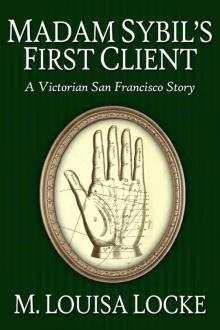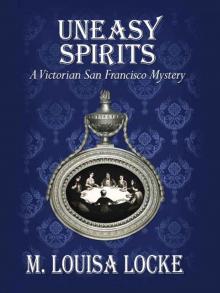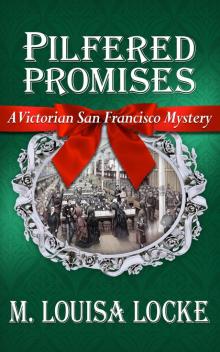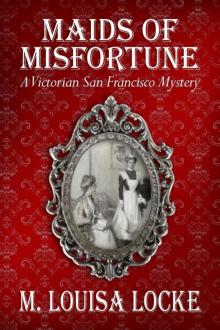- Home
- M. Louisa Locke
Pilfered Promises Page 7
Pilfered Promises Read online
Page 7
The two girls met when they were both small…living in the same crowded, noisy boarding house south of Market, both of them trying to help their overworked mothers raise a brood of younger children. But while Kathleen just had three brothers to look after, Biddy, a year younger but already several inches taller, was the oldest of seven…including two sets of twin boys. Kathleen wasn’t sure she would have survived the year between her mother’s death and when her father died without the help of Mrs. O’Malley and Biddy. But then her uncles split up her brothers and sent her out to service, and she’d lost touch with the whole O’Malley clan––until a year ago when Kathleen ran into Biddy while she was helping Mrs. Dawson with one of her investigations.
After ten minutes it’d seemed like the five years they’d been apart had vanished. Soon Biddy became part of Mrs. Dawson’s investigation of a popular trance medium, and for a couple of weeks it was like old times for the two of them, gossiping and laughing together. And it was Biddy who’d brought her cousin Tilly to them…to help cover the time Kathleen was away from her work while chaperoning her mistress.
Tilly had been newly arrived from Ireland, underfed, unskilled in anything but baby-tending, and with an accent so broad that even Kathleen, who’d been raised by a mother who still spoke Gaelic, couldn’t always understand her. But bless Mrs. O’Rourke and Mrs. Dawson, they’d given Kathleen a chance to train the girl and give her some polish and even hired her full time as soon as Mr. Nate moved in and started contributing to the household finances.
However, since the case they’d been working on with Mrs. Dawson had ended, Kathleen and her friend’s paths hadn’t crossed. Tilly did keep them up to date, telling them about the trouble her cousin had at one of her jobs when a mill foreman got fresh. Biddy’d slapped him and then gotten fired. But as usual for Biddy, she’d landed on her feet, with a job doing finishing work for the dressmaking department at the Silver Strike Bazaar. Which was no surprise since her mother used to support the family with her needle––a skill she’d started teaching her oldest daughter when she was no more than six. In fact, it had been Mrs. O’Malley who’d taught Kathleen to sew, bless her soul. Which was coming in mighty handy as Kathleen tried to fix Mr. Nate’s sorry wardrobe.
“So Tilly tells me you are still walking out with that good-for-nothing Patrick McGee,” said Biddy.
“You’re one to talk,” Kathleen shot back. “I’ve heard tell that a certain Wells Fargo messenger was seen dancing every dance with you at the last St. Joe’s ball.”
“Lies…all lies. The boy doesn’t come up to my chin. Besides, I got my eye on Frankie O’Doyle; there’s a boy who knows how to do a proper jig.”
“O’Doyle? Works in the butcher shop on Taylor? Well, now…”
“Ma’am, the mistress says she’ll be right down,” said Tilly, who’d clearly run all the way up and back down the stairs. Then she blushed bright red…her normal reaction when more than one person looked at her…and she went over and started on the dinner dishes.
Biddy smiled at her young cousin then leaned in close to Kathleen and said, “So what’s your mistress up to at the Silver Strike? Far’s I know, no one’s gotten themselves killed…so what’s she doing there? Something shifty going on?”
“Well, Miss Bridget, there is something ‘shifty going on,’” said Kathleen’s mistress, who had just arrived in the kitchen. Reaching out and giving the young girl a hearty hand shake, she said, “And I think you might be just the young woman to help me uncover exactly who’s to blame.”
“So you think Bridget will be able to help you?” Beatrice asked, pouring her a cup of tea an hour later.
“I don’t know, it’s early days yet,” Annie replied. “She’s a very perceptive young woman, so I value her opinion on some of the people I met today…like Monsieur Villeneuve. He’s very French. All charm, waxed mustache, and white teeth. Yet Biddy believes he really cares about the Silver Strike being a success, so it’s doubtful he’s behind any of the thefts. And, from the work I did today, I am confident that thefts are indeed happening.”
Biddy and Tilly had just left, Kathleen was upstairs cleaning ash out of the dining room and parlor fireplaces, and Annie had decided to linger in the kitchen with her cook for a while to give Nate some privacy. He was finishing up the document he hoped to get Violet’s father to sign tomorrow when they met. She rubbed her temples, the headache she’d come home with refusing to ease. When she looked up to take the cup from Beatrice’s outstretched hand, she saw the motherly concern on her friend’s face and knew what was going to come next.
“My dear, are you certain taking on this job is a wise move? I can see it’s already a strain on you. With the holidays coming up and all…”
She knew that the “and all” referred to Beatrice’s hope that Annie would be pregnant soon. A hope that Annie couldn’t completely share. Not that she didn’t want a child…eventually. But she knew that Beatrice believed that if…no, when…Annie was expecting that she would stop working…or at least stop getting involved in investigating criminal activities. And that was one of the reasons she felt ambivalent about becoming pregnant right away. Nate had assured her that he wouldn’t expect her to stop working. But…she knew that reality could change expectations, for both of them.
However, this was certainly not a discussion she wanted to have with Beatrice tonight, so she shifted the conversation to the upcoming holidays, replying, “Bea, are you saying you don’t have the plans for Thanksgiving already well in hand? I’m shocked!”
Putting her hands on her ample hips, the cook shook her head and said, “Don’t you go thinking I will take that bait. You know full well that Kathleen and I have been getting ready for weeks, including putting in our order for a turkey. And before you ask, I told ’em over at Magill’s I don’t want some scrawny bird that’s been shipped in from heaven knows where. I want to inspect the bird before they butcher it, make sure it will feed us all.”
“The one you got from them last year was delicious and more than enough.” If Annie remembered correctly, the table had literally groaned under the weight of the bird her cook had roasted and all the side dishes she’d prepared.
Beatrice said, “Well, they are one of the most reliable butchers in town. I would like to go over the final menu with you and figure out the total number of people we will be serving. Did Mr. Dawson find out if his uncle will be coming?”
“Oh, I’m sorry, I forgot to tell you. His Uncle Frank said he’d be delighted to join us, and Nate has invited Mitchell, his friend from his old boarding house who is studying to be a doctor.”
Annie started counting on her fingers. “So with Nate and me, the Moffets, Mr. Chapman, Barbara and Jamie, that makes nine. Mr. Harvey will be back in Sacramento with his family, and the Steins will be celebrating with their children. But Laura has invited Seth and two more of her friends from the university, so that brings us up to thirteen. An unlucky number…no, Barbara Hewitt asked if she could bring one of the teachers she works with who doesn’t have family in town. So that brings us to fourteen at the table. Excellent. But will one bird be enough?”
“I’ve ordered a good side of smoked ham just in case. Not everyone likes turkey.”
“Oh, Beatrice, you think of everything. Do make sure there are enough leftovers for you and Kathleen, and you did say Tilly will be here rather than spending the day with her family?”
“Yes, the girl will be a big help. And I wouldn’t be surprised if Patrick will stop by when he gets off patrol. With everything closed for the day, his new beat around Union Square should be pretty quiet.”
Annie frowned. “You know, now that you mention it, I should ask Mr. Livingston what his plans are for security for the Silver Strike on Thanksgiving. If someone is literally walking goods out of the basement where the extra inventory is held, then Sundays and a holiday like Thanksgiving would be perfect times for this to happen.”
Kathleen, who’d just come into the kitchen, said, “Ma’am,
I meant to tell you. When I saw Patrick yesterday after mass, he said he was thinking about asking if Mr. Livingston wouldn’t take him on as extra security…at least during this busy time. Lots of the larger businesses do that––hire policemen to work for them after hours. The chief doesn’t mind, as long as it doesn’t interfere with a man’s ability to do his job.”
“Kathleen, that seems too much to ask. He already works such long hours.”
“Well, he said he could use the extra money before Christmas…and it wouldn’t be forever, since you’ll figure out what is going on in no time.”
Annie wished she shared Kathleen’s optimism. It wasn’t that she hadn’t found confirmation that there was something “shifty” going on. Rather, it seemed there was too much going wrong at once. Inventory that was checked in but never seemed to make it to the shelves. A growing number of goods that did make it to the shelves listed as “lost” or “destroyed” at the end of the day. Even a spike in discrepancies between the price of goods sold and the change listed on the receipt…as if some of the cashiers had suddenly lost their ability to subtract accurately.
Her head began to throb just thinking of all the possibilities. The Thanksgiving menu could wait one more day. Where she wanted to be was upstairs in the arms of her husband, where questions of who was robbing the Silver Strike, or whether or not the turkeys would be large enough, didn’t matter one bit.
Before Annie had a chance to act on her decision to go up to her room, a scrabbling sound from the back stairs announced the arrival of the Boston terrier, Dandy. He was followed closely by Jamie Hewitt, his ten-year-old master. Jamie and his mother, Barbara, occupied rooms in the third floor attic.
Everyone in the boarding house loved Jamie. And Dandy, named because his black and white coloring made him look like a gentleman out on the town, could win a smile from the most hardened cynic. He was just that cute. He was also immensely loyal to his master and had demonstrated, on more than one occasion, a degree of good sense and bravery you wouldn’t expect from a dog that small or that young.
Today, however, he didn’t look the least bit heroic as he ran excitedly around the kitchen, his diminutive nose pressed firmly to the linoleum, snuffling up anything that might have fallen on the floor. The only thing that deterred him from his quest was when Queenie, the big old black kitchen cat, reached out and batted him as he ran by. He stopped, cocked his head, and gave her one of his wide doggy smiles, then went back to his search for tasty crumbs.
Kathleen laughed. “I won’t need to worry about sweeping up tonight. Dandy’s done my job for me.”
“Dandy, stop that this minute and come outside,” Jamie said. “I’m sorry. He acts like he hasn’t eaten in months.”
Looking at the dog, who was now on his third full circuit of the kitchen, Annie said, “Well, I guess you need to account for the fact that he never actually travels anywhere in a straight line so his meals last only half as long. Come here, boy. Let’s give you a proper treat, then go out and do your business.”
She reached into the jar where Beatrice kept scraps just for Dandy and fished out a bit of beef from dinner. Dandy came to her like a shot, sat his skinny rump down, his large ears erect on his round head, and put up one of his white front paws as if to shake. She laughed and held out her hand for him to snatch the meat, which he did, making it disappear in an instant before obediently trotting over to Jamie and going out into the yard.
Ten minutes later, Annie accompanied Jamie and Dandy up the back stairs, while asking the boy about how school was going. When they got to the second floor, she decided to continue on up with him to the attic. It was only eight-thirty, and she hoped that Miss Minnie and Miss Millie Moffet might still be up. She wanted to see if they knew anything about Mrs. Fournier and the Silver Strike dressmaking department.
Seeing that there was still a light showing under the door of their workroom, she knocked gently and asked if she might bother them. Miss Millie, the younger sister, opened the door, her wrinkled face wreathed in smiles.
Her older sister, Miss Minnie, stood right behind her, and, as usual, did all the talking. “Mrs. Dawson, so good of you to stop by. Please come right in and sit down. Millicent was just saying that we missed you and your husband at Sunday dinner. We understand how it is; that husband of yours wants to keep you all to himself. Can we pour you a cup of hot cocoa? That little Tilly always brings up a fresh pot before she goes for the night. Such a sweet child…although I can’t understand a word she says. Reminds me of the last little Irish maid we had work for us. Millicent, do you remember? Perhaps that was why dear brother Jasper decided we shouldn’t spend money on a servant anymore…too much bother.”
During this outpouring from Miss Minnie, her sister continued to draw Annie into the room and got her seated, all done with a silent smile.
Miss Minnie’s flow of words faltered for a second, and Annie jumped in, saying, “Thank you so much. I won’t stay long. I wanted to see if you would be willing to share some of your knowledge of dressmaking with me. You see, I’ve taken a job looking into some possible thefts at the big store over on Sutter and Powell, the Silver Strike Bazaar. Do you know it?”
Miss Minnie beamed at Annie and said, “Oh, we do know it well. We’ve found some of the most wonderful bargains there on thread and needles and such. And quite good quality. ‘A penny saved is a penny earned,’ as I always say. Sister and I would be honored if we could assist you in any way. Millicent was just reminding me the other day of how helpful you were when we had that spot of worry about Mrs. Porter and how we’ve never really been able to repay you. Do tell us how we can help.”
On the surface, these two white-haired spinsters, both in their seventies, didn’t seem like they would be much help in any investigation. Yet from experience, Annie knew that these elderly ladies had unsuspected depths. From what Annie had gathered from Miss Minnie’s constant flow of reminiscences, they’d been raised in pampered luxury in a wealthy slave-holding family in Natchez, Mississippi, until an explosion of an uninsured cargo forced their father, a steamboat captain, into bankruptcy. While Miss Minnie never said as much, it was pretty clear that from that day on the sisters had been forced to use their dressmaking skills to help support their family––including the aforementioned “dear brother” Jasper. He was the younger brother who dragged them out west when their mother died and had been, as far as Annie could determine, a feckless ne’er-do-well who lived off their increasingly successful dressmaking business in San Francisco.
According to Mrs. Stein, the boarder who’d introduced the Moffets to Annie, when Jasper died a few years ago, he’d left them with debts and an about-to-be foreclosed home. But they never complained. Well, Miss Minnie didn’t; her sister never said anything at all. Just smiled. But that didn’t mean their minds weren’t needle sharp.
“That is most kind of you,” Annie said. “Some other day I would like to show you some of the accounts I have been going over, ask a few specific questions about the cost of materials…prices for finished goods and so forth. But tonight I just wanted your more general impressions. You mentioned that you felt the sewing supplies were a bargain. What about the dresses they make? Do you think they are charging too much? Or too little?”
Annie noticed Miss Millie stir in her seat in the corner where she’d been busily stitching away at a strip that looked like it was going to the flounce on a black silk dress.
Miss Minnie gave her the kind of look a teacher gives you when you ask just the right question and said, “Ah, that is an interesting question. Millicent and I always take a little stroll around the dress departments when we go into any of the large emporiums, like City of Paris or the Silver Strike. Millicent says it’s important to keep up with the competition. The first year they were open, the outfits at the Silver Strike were remarkably inexpensive.”
Annie started to open her mouth to speak, but Miss Minnie’s comments flowed on.
“Now, I’m not talking about the ready-m
ade dresses they sell. Stands to reason if you are buying something that won’t fit you and a hundred other women are wearing…you don’t expect to pay much.” Miss Minnie sighed as if she were saddened by the folly of any women who bought these kinds of dresses.
She then went on, “No, Mrs. Dawson, I am speaking about the higher-end custom-made ensembles you can order at the Silver Strike. You might ask how we know what these clothes sell for, since they are custom made? Well, I must confess we prevaricate just a little when we stop by. Telling the clerks that we have a young niece who lives down the peninsula who has asked us to be on the lookout for a new ensemble. The clerks at the Silver Strike are so helpful, bringing out examples of some of the dresses they are making, letting us look closely at them. They will even give us a general quote on their prices. We try to come when we know the store isn’t busy, so we aren’t really inconveniencing these young women. We’re not robbing them of a sale, is what I say to Millicent, and it’s good practice for them.”
Here Miss Minnie looked over at her sister, as if this was part of an ongoing disagreement between the two. Annie suspected that the clerks knew very well that these two elderly women were never going to buy anything but were just being kind. She wondered if they had any idea who the Moffets really were and if they did, if they would have been quite so helpful to one of their competitors.
Annie took advantage of Miss Minnie’s pause to ask, “So you think they are charging too little for these clothes?”
“Well, for the quality of the materials and the workmanship, which was really quite good, they were certainly being sold at a lower price than we could afford to charge. But since they buy their material in bulk, I assume they get a much steeper discount than we can get from the wholesalers. So they can produce the work more cheaply and still make a profit. To find bargains is why many people go to these stores, after all, isn’t it, Mrs. Dawson?”

 Scholarly Pursuits
Scholarly Pursuits Lethal Remedies
Lethal Remedies Victorian San Francisco Stories
Victorian San Francisco Stories Madam Sibyl's First Client: A Victorian San Francisco Story
Madam Sibyl's First Client: A Victorian San Francisco Story Uneasy Spirits: A Victorian San Francisco Mystery
Uneasy Spirits: A Victorian San Francisco Mystery Dandy Detects: A Victorian San Francisco Story
Dandy Detects: A Victorian San Francisco Story Pilfered Promises
Pilfered Promises Dandy Delivers
Dandy Delivers Kathleen Catches a Killer
Kathleen Catches a Killer Violet Vanquishes a Villain
Violet Vanquishes a Villain Maids of Misfortune: A Victorian San Francisco Mystery
Maids of Misfortune: A Victorian San Francisco Mystery